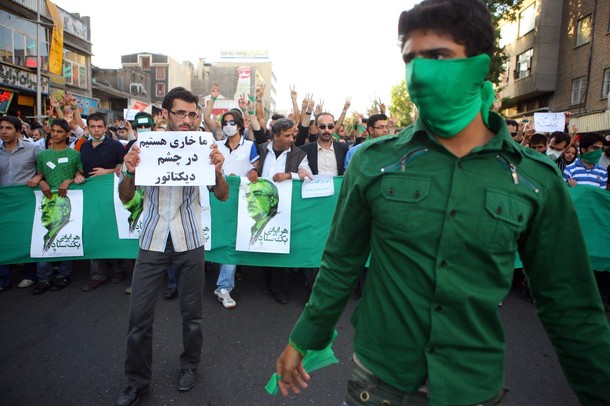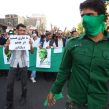
Turkey Anxious over Mass Protests in Iran
Publication: Eurasia Daily Monitor Volume: 6 Issue: 117
By:

Following the controversial presidential election in Iran, the Turkish media coverage has revealed a mixed interpretation of events, and appears to indicate widespread support in the country for the re-election of the incumbent Mahmoud Ahmadinejad. Several hours after the polls closed in Iran the reformist candidate Mir Hossein Mousavi declared victory. Only minutes after his press conference, Iran’s state owned news agency IRNA reported that the hard-line President Ahmadinejad also declared victory (Zaman, June 13). The Turkish press had sent their correspondents to Tehran to closely monitor the election. Turkey’s leading daily Hurriyet immediately after the poll, speculated about the possibility of social unrest and protests in Iran (Hurriyet, June 13).
As the protests grew in strength, the Iranian opposition leader Mousavi issued a direct challenge to the country’s supreme leader and cleric-led system, calling for a mass rally to protest against the disputed election results, and the instances of state-inspired violence against his followers. In response Iran’s most powerful military force said that Iranian websites and bloggers must remove any material that "creates tension" or face legal action (Hurriyet Daily News, June 18).
The key aspect of these developments, which attracted the attention of the Turkish media, was whether the "green wave" protests might spark a reformist revolution. Despite the fact that the opposition leader Mousavi rejected the claims that his "green wave protests are supported by outside supporters," (Hurriyet, June 18) the nationalist Turkish press displayed a tendency to believe that Iran is facing a new revolution similar to those in Georgia, Ukraine and other former Soviet Republics that were supported by the United States and the European Union.
For instance, the neo-nationalist Yeni Cag daily alleged that the west is the "dark force" behind the protests in Iran, aiming to topple the Iranian regime. Yeni Cag prefers to regard the protests as revealing that the "patience of the Iranian people is about to explode [against the protest]" (Yeni Cag, June 18).
Turkish political observers have also tried to associate the protests in Iran with the revolutions in Georgia, Ukraine and other former Soviet republics. Mahir Kaynak in the Star daily said that the global powers were unsuccessful in their alleged efforts to bring about yet another color revolution -this time in Iran (Star, June 16).
Ibrahim Karagul in Yeni Safak suggested that the events in Iran might be a sign of new developments encouraged by the "dark forces" of the west to bring a reformist revolution to Iran (Yeni Safak, June 17). Nuray Mert in Radikal was another political observer alleging that the protests in Iran might indicate an imminent "green" revolution (Radikal June 16).
Semih Idiz of Milliyet noted that the victory of Ahmadinejad represents a huge disappointment for Saudi Arabia, Egypt, Jordan and other Middle Eastern countries. However, when it comes to Turkey, it appears that the AKP government is not disappointed with this result. In addition, no matter whether they belong to the secular or Islamist segments of Turkish society, those with anti-American and anti-Western sentiments are happy to see the re-election of Ahmadinejad (Milliyet, June 15).
Yet there are some Turkish political observers who think that the victory of Ahmadinejad might not prove negative for the west. Kadri Gursel in Milliyet for instance, argued that a victory for Mousavi would be a good option, though he stressed that during the election campaign Ahmadinejad avoided using any anti-American or anti-Israeli sentiments to turn them into an election tool (Milliyet, June 15). The director of the International Strategic Research Center in Ankara Sedat Laciner, also believes that Ahmadinejad is signaling possible compromise with the west, and Mousavi may not be the right person to conduct such negotiations, since his reformist agenda is not supported by all sections of Iranian society (www.usakgundem.com, June 12).
It appears that, other than a small minority who care about the potential strategic significance of the election, the majority of the Turkish public regardless of their background, seem happy with the outcome of the Iranian election. In addition, they do not approve of the protests in Iran, and they believe that the West is the main driving force behind these expressions of public discontent.
Islamists in Turkey are satisfied with the Iranian election, because an Islamist has apparently won. The secularists are equally content, as they fear that the west might be sponsoring protests in Iran in order to topple the regime. Most importantly, the neo-nationalists in Turkey have long lived with the fear that the West wants to change the secularist regime, because Turkey with its nation-state structure is one of the biggest obstacles to further globalization. As a result of such an obscure conspiracy theory, neo-nationalists are also pleased to see that Ahmadinejad has secured his re-election.




